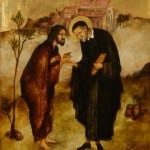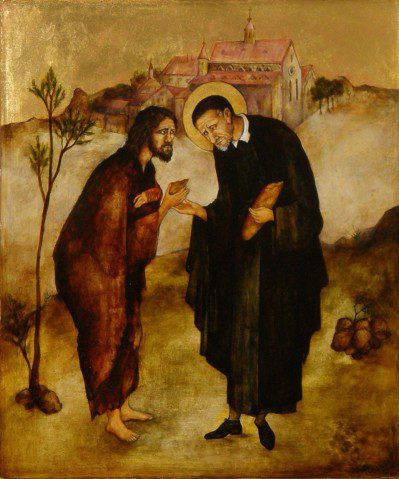 Vincent deeply believed Jesus (Mt. 25) and James (James 2:14-17). The following quotes are from an article on “Vincent and Liberation”
Vincent deeply believed Jesus (Mt. 25) and James (James 2:14-17). The following quotes are from an article on “Vincent and Liberation”
“The liberating activity of Vincent has two aspects: [1] evangelization or the proclamation of the Good News, which consists of telling those individuals who are enslaved in ignorance, superstition or sin that they are children of God and as such, called to live in the freedom of God’s children and therefore they should conduct themselves as sons and daughters of God; [2] at the same time that the Good News is proclaimed, concrete action is necessary in order to make the proclamation credible … the material life of those persons must be transformed. It is not enough to tell people that they are children of God, something must also be done about the inhuman misery in which these people find themselves.”
“Vincent was attentive to these two aspects in all his initiatives. The proclamation and the concretization of the Good News of liberation is what Vincent called preaching the Gospel by words and by works, and that is the most perfect way (CCD:XII:78)”
Vincent de Paul’s activity on behalf of liberation had two aspects: [1] evangelization or the proclamation of the Good News [2] concrete action in order to make the proclamation credible. Engaging in this process in any other way simply makes a mockery of the Good News because then we would be proclaiming the joyful news of a liberation which we ourselves did not believe, a liberation which we did not want because we preferred the gilded enslavement to money and power. This is the accusation that has often been leveled against the Church when she has proclaimed the Gospel with words but failed to accompany those words with effective action … when she has proclaimed the demands of freedom but continued to act in an authoritative manner … when as teacher of the truth she has instructed the world but made no effort to become “servant and poor”, made no effort to draw closer to people.
For abundant illustrations in Vincent’s words and action see links below
Thought starters…
[A] When we speak about “liberation”, what is our personal experience in this regard? What is our understanding of this concept?
[B] How is the gospel a source of liberation?
[C] How are our communities signs of freedom and liberation?
Outline of the article
Vincent and Liberation
1 Presentation of the theme
2 Vincent de Paul and Liberation
2.1 Prophetic action
2.1.1 on behalf of abandoned children
2.1.2 on behalf of beggars
2.1.3 on behalf of prisoners
2.1.4 on behalf of slaves
2.1.5 behalf of the illiterate
2.2 The spirit of liberation according to Vincent de Paul
3 Questions for reflection and dialogue
Translated: Charles T. Plock, CM
[This article appeared in Volume II of En tiempos de San Vicente de Paúl … y hoy, Editorial CEME, Santa Marta de Tormes (Salamanca) Spain, 1997, p. 177-188. The above cited work was translated from the French by Martín Abaitua, CM (Au tempts de St. Vincent-de-Paul… et aujourd ‘hui), Animation Vicentienne, 16, Grande rue Saínt-Michel, Toulouse, France … this work is not attributed to any one author but it is stated in the Introduction that the articles were written by various authors].
Tags: liberation, Preaching, Vincent


Pope Benedict on human dignity…
“Our human dignity is inseperable from the sacredness of life as a gift of the Creator. In God’s plan, each person is unique and irreplaceable. A person comes into this world in a family, which is the first focus of humanization, and above all the first school of peace. To build peace, we need to look to the family, supporting it and facilitating its task, and in this way promoting an overall culture of life. The effectiveness of our commitment to peace depends on our understanding of human life. If we want peace, let us defend life!”
Pope Emeritus Benedict XVI